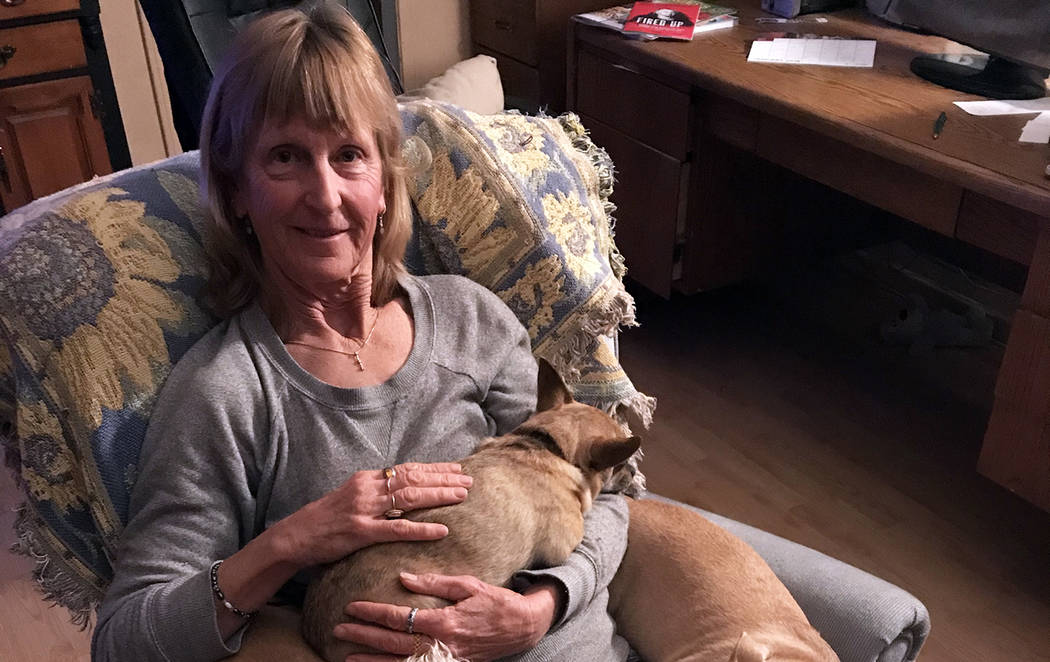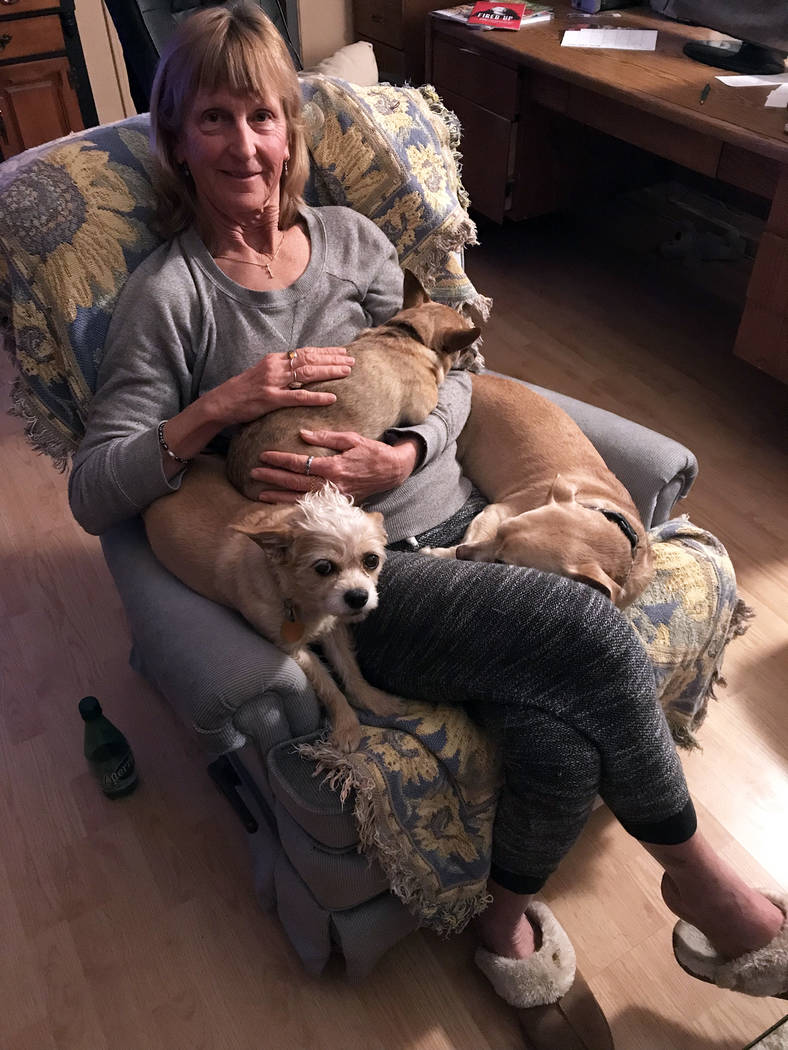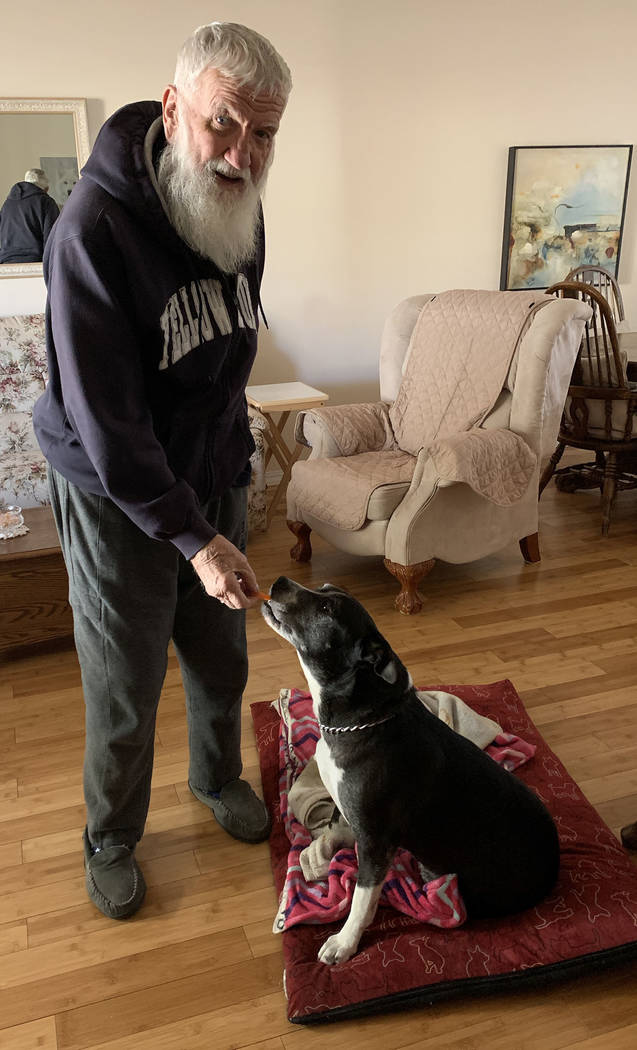Power of paws-itivity: Pets enrich seniors’ lives
If you ever had any doubt about how much Nancy and Don Carlyle love their dog, Molly, all you have to do is drive by their house in Boulder City. On the front porch is a big sign with Molly’s picture that declares this is her home.
“She filled a void we didn’t realize was there,” said Don Carlyle.
She is loving and supportive. She alerts them of problems and gives them someone to care for.
Molly’s impact on the Carlyles echoes the sentiments of other seniors who have pets in their home.
Companionship and a sense of purpose are among those benefits, said Boulder City Animal Shelter Supervisor Ann Inabnitt.
“You’re not just sitting on the couch. You have a reason to get up in the morning and get moving,” she said.
According to the Aging in Place website, the top six reasons senior citizens should adopt a pet are calmness, companionship, daily exercise, purpose, security and staying social.
“As seniors, we don’t have kids to worry about, so our pets are our priority,” said Sara Carroll, a Boulder City resident who has adopted numerous pets from the shelter.
“If you lose a spouse and your child lives far away, that love has gotta go somewhere,” Inabnitt said.
GOOD HEALTH
Having a pet is also good for your health.
Last year, the Mayo Clinic released a study that said owning a pet, specifically a dog, may reduce a person’s risk of cardiovascular disease.
“In general, people who owned any pet were more likely to report more physical activity, better diet and blood sugar at ideal level,” says Andrea Maugeri, Ph.D., a researcher with the International Clinical Research Center at St. Anne’s University Hospital in Brno, Czech Republic, where the study was performed, and the University of Catania in Italy. “The greatest benefits from having a pet were for those who owned a dog, independent of their age, sex and education level.”
A 2018 national poll on healthy aging sponsored by AARP and the University of Michigan surveyed 2,051 adults between the ages of 50 and 80, more than half of whom reported owning a pet. Eighty-eight percent said that their pets helped them enjoy life, and 86 percent said their pets made them feel loved. The poll also reported that 79 percent of senior pet parents said that their four-legged (or feathered or finned) friends reduced stress.
Additionally, among those who lived alone and/or reported fair or poor physical health, 72 percent said pets help them cope with physical or emotional symptoms.
SPECIAL CONNECTION
Molly came to the Carlyles after Don was dropping off some donations at the Boulder City Animal Shelter.
He said that after losing their 17-year-old dog they swore that they wouldn’t get another one.
Inabnitt, however, had another idea.
“She said ‘You need a dog,’ ” Don Carlyle said. “She’s a magic worker.”
Nancy Carlyle said they were concerned about how a dog would react to the wheelchair she is confined to since being paralyzed a few years ago.
When they went to meet Molly, who had been at the shelter for about six months, she wasn’t afraid of the wheelchair and went right up to it so Nancy could reach her, they said.
“We made a good connection. She’s very much a part of our family,” Nancy Carlyle said.
Then, after Don Carlyle returned home from the hospital with a heart condition diagnosis, Molly has been at his side, literally leaning against him or sitting on top of his feet.
SPREADING HAPPINESS
Carroll, who has lived in Boulder City since 1981, said she has adopted numerous older pets from the local shelter.
“I try to get animals that are pretty much unadoptable. These are dogs that are older or they’re skittish or unattractive. People don’t want them.”
Carroll said her heart goes out to those animals. She has adopted dogs, cats and even rats.
“I know we can make them happy. We want to make the rest of their lives happy.”
Carroll is a retired teacher and continues to substitute but is probably best known for coaching the championship swimming dynasty at Boulder City High School.
She said she and her husband, Bill, have a large property and her dogs and cats pretty much have control of the house.
She said she feels it’s important to have more than one pet in the home.
“It’s good for the pet. They have company when you’re gone.”
Though she said the animals keep each other company, neither she or Bill will both be gone for extended periods of time.
SENIORS WITH SENIORS
Inabnitt said one of the most successful things the shelter has done is placing senior pets with senior citizens.
“Boulder City is different. People want those senior dogs,” she said. “We get a lot of beautiful, well cared for, well-loved animals. They are so easy to place.”
According to Inabnitt, senior pets, typically 7 or older, are usually housetrained and past the destructive puppy phase. They also are settled into who they are.
“With a puppy, you don’t know its personality.”
Inabnitt said she is careful when placing a senior animal that comes to the shelter after its owner died.
“I try to re-create that environment for the animal.”
She said she looks for homes where the new owner will have a similar lifestyle as the deceased owner. She considers things such as other animals in the home, whether the animal likes to nap in someone’s lap or is used to talking long walks every day.
Inabnitt said she keeps a notebook filled with potential adopters’ preferences, so that when a senior dog or cat comes in, she can make better matches.
Additionally, having information from the animal’s previous owner, including its likes and dislikes and how it’s been cared for, gives the new owner a better understanding of who that animal is and how it will be to have it in your home.
“That’s pretty powerful,” Inabnitt said.
FUTURE TO CONSIDER
Though the benefits of adopting a pet far outweigh the downsides, Inabnitt said senior citizens must consider the possibility that their canine or feline companions might outlive them and make suitable arrangements.
“If grandma passes away and has a dog, you will go immediately and get the dog. But a cat, with food and water, can stay on its own for a few days.”
Inabnitt said being on its own can be extremely traumatic for a cat, who grieves for the loss of its owner.
She knows this from experience. Once, a cat came to the shelter after its owner had died in their home. She was found curled up in a little ball when relatives arrived to clear the house.
“She knew she was utterly alone,” Inabnitt said. “It took me six weeks to get her to lift her head.”
The Carlyles are well aware of this, especially in light of Don’s condition, and have thought about what will happen to Molly, who has arthritis and needs medication, if they can no longer care for her.
“They’re like children,” Nancy Carlyle said. “You never know … you have to make those plans.”
Nancy Carlyle said they would likely return Molly to the shelter, along with funds to cover her veterinarian bills and medication.
“They can have our doggy door and all that we have,” she said.
The couple also spoke with their caregiver about the possibility of taking Molly if it becomes necessary.
BE SPECIFIC
Inabnitt said it’s important that pet owners make their wishes for their animal companions known, provide a list of likes and dislikes, give access to their medical records and, if possible, allocate resources for their care.
“Know what kind of life you want for that animal,” she said, adding that you need to make sure that the person you entrust with that pet’s care truly understands what you want and is capable of providing that.
“For me, what happens to animals is just as important as what happens to things,” she said. “They are part of the estate.
“It hurts my heart to watch these animals grieve. It hurts my heart to see animals in a situation so foreign to them. I’d rather see them hang out with me for a couple of weeks until I can find them a new home.”
Hali Bernstein Saylor is editor of the Boulder City Review. She can be reached at hsaylor@bouldercityreview.com or at 702-586-9523. Follow @HalisComment on Twitter.
















